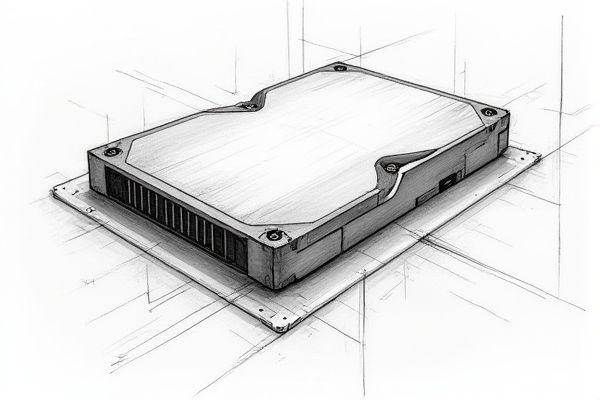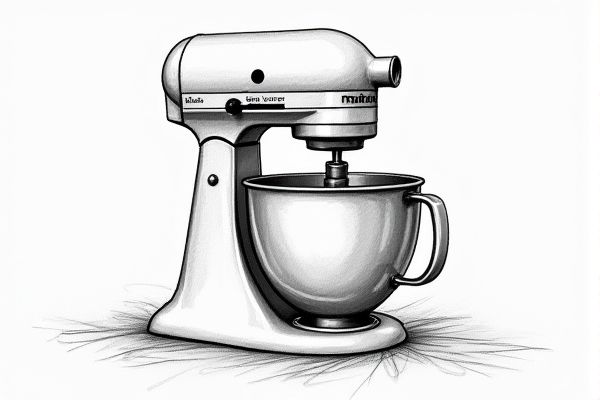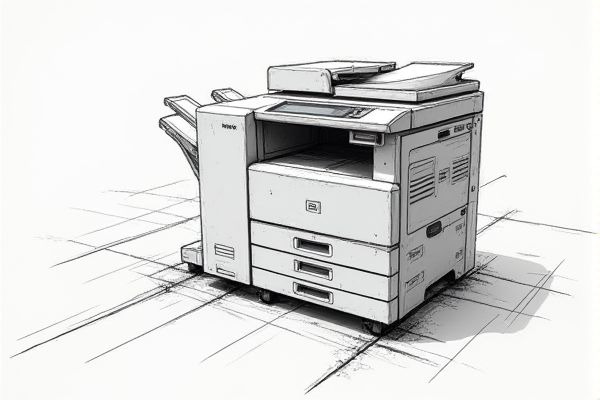In the ever-evolving world of technology, choosing the best SSD drive can be a daunting task given the myriad of options available. With speed, storage capacity, and reliability being at the forefront of consumer demands, several brands have risen to the top as leaders in the SSD market. From blistering fast read and write speeds to top-notch reliability and durability, these brands provide SSDs that cater to both everyday users and professional enthusiasts. To discover which SSD brands reign supreme and why they might be the perfect fit for your needs, continue reading below.

Illustration of ssd drive
Best brands of ssd drive in 2025
Samsung
Samsung is a leading producer of SSD drives, dominating the global market with a significant share. As of the fourth quarter of 2023, Samsung controlled 41.7% of the global eSSD market, far surpassing its competitors. The company has consistently innovated, launching high-capacity SSDs such as the 128TB BM1743, which boasts sequential read speeds of up to 7.5 GB/s and write speeds of up to 3 GB/s. Samsung's market dominance is also reflected in its historical data, where it shipped over half of the world's enterprise SSDs in Q3 of 2022, with a market share of 53.6%. This leadership is a result of its advanced technology and continuous innovation in the SSD sector. For more details on Samsung's SSD offerings, you can visit their official SSD page.
Crucial
Crucial, a renowned brand under Micron Technology, is one of the leading producers of solid-state drives (SSDs), known for their high performance, reliability, and cost-effectiveness. The global SSD market, which was valued at USD 55.34 billion in 2023, is expected to grow significantly, with Crucial playing a key role due to its advanced SSD solutions such as the P5 and P3 series, which offer faster data transfer speeds and lower latency. The market is projected to reach USD 238.07 billion by 2032, growing at a CAGR of 17.6% from 2024 to 2032. Crucial's SSDs, particularly those using SATA and PCIe interfaces, are widely adopted in various sectors, including data centers, personal computers, and mobile devices. The brand's focus on integrating 3D NAND technology and developing larger capacity SSDs further enhances its market position.
Western Digital
Western Digital (WD) is a leading producer of SSD drives, known for its high-performance and reliable storage solutions. In Q1 2024, WD's high-capacity HDDs generated 35% of the total revenue, amounting to around USD 1.08 billion, while the new NVMe SSDs showed up to a 40% improvement in read and write speeds compared to the previous generation. The company also launched new high-capacity hard disk drives with storage capacities up to 20TB in March 2024 and plans to introduce Energy-Assisted Magnetic Recording (EAMR) technology-based HDDs in Q3 2024, offering up to 15% better storage density. WD holds a 10.5% market share in the NAND flash industry as of Q2 2024. The company's innovations and product lineup make it a significant player in the storage market.
Kingston
Kingston Technology has solidified its position as a leading producer of SSD drives, retaining the top spot in the channel SSD market for 2023 with a 23.8% market share. The company shipped 27.4 million client SSDs in 2023, including 5.7 million units in Q4 alone, securing a 21.3% market share for that quarter. Kingston's success is attributed to its high-performing SSDs, such as the NV2 and Kingston FURY Renegade, and its exceptional customer support. This marks the sixth consecutive year Kingston has held the number one position in the SSD market. For further details, please visit their official press release.
Seagate
Seagate, although a leading manufacturer in the hard disk drive (HDD) market, does not dominate the solid-state drive (SSD) sector. In fact, HDDs continue to be Seagate's main revenue generator, with over 90% of cloud data centers relying on HDDs for storage due to their cost-effectiveness and high capacity. Seagate's focus remains on HDD technology, particularly for hyperscale and enterprise applications, where HDDs offer the best total cost of ownership (TCO). The company has not made significant strides in the SSD market, which is dominated by other manufacturers. As of recent data, Seagate's revenue is predominantly from HDD sales, with SSDs contributing a much smaller fraction. For more details, visit Seagate's official website.
SanDisk
SanDisk is a renowned brand in the SSD market, recognized for its high-quality flash storage solutions. Despite holding a relatively small market share of 0.10% in the enterprise data storage sector, SanDisk delivers reliable and performance-driven SSDs that are essential in data centers, smartphones, tablets, and laptops. The SSD market, to which SanDisk contributes, is projected to reach USD 65.47 billion in 2024 and grow at a CAGR of 17.56% to reach USD 147.01 billion by 2029. SanDisk's products are trusted by consumers worldwide for their durability and speed, with over 879 companies adopting SanDisk as an enterprise data storage tool in 2024.
Corsair
Corsair is a leading producer of high-performance SSD drives, known for its significant market share and innovative products. The company has consistently gained market share in the gaming components sector, including SSDs, with a 73% market share in gaming components excluding memory as of Q2 2023. The global SSD market, in which Corsair is a key player, is expected to grow by USD 167.41 billion from 2024-2028, driven by enhanced performance and durability. Corsair's products are highly regarded for their performance, reliability, and innovative design, contributing to the company's strong financial performance, including a 16% year-over-year increase in the Gamer and Creator Peripherals segment for Q4 2023. This growth underscores Corsair's position as a top choice for SSD drives.
Adata
ADATA is a prominent player in the SSD market, known for targeting high-end hardware and gaming enthusiasts. In 2023, ADATA held a 9% market share, positioning it as the second-largest SSD module maker globally, following Kingston which held a 28% share. For more detailed insights into their SSD offerings, visit their official website.
Intel
Intel, once a leading player in the enterprise SSD market, has seen its market share decline significantly. In 2019's third quarter, Intel and Samsung each held about 35% of the enterprise SSD capacity shipped, but by a later period, Intel's share dropped to 15.2% while Samsung dominated with a 53.6% share. Despite this, Intel remains a well-known brand, especially with its recent transition of its SSD business to Solidigm, which now holds a combined 23.8% share when including SK Hynix. For detailed information, including their technical advancements, you can view Intel’s datasheet on Core Ultra Processors.
Toshiba
Toshiba is a prominent player in the SSD market, having entered the industry with its own products in the first quarter of 2008 and quickly gaining traction. By 2016, Toshiba's SSD business was the fourth largest by market share and was recognized as the fastest-growing SSD vendor, according to IDC's "Worldwide Solid State Storage Quarterly Update" for Q4 2016. Toshiba's flash memory business has been crucial, especially during periods of memory shortages, which highlighted the company's value in the market. Despite challenges, such as the sale of its memory business, Toshiba has continued to innovate, including the development of 2-bit-per-cell MLC flash memory that offers four times the capacity of SLC flash on the same silicon footprint. Toshiba's SSDs have also been integrated into various markets, including notebooks and enterprise systems. For more details, visit their official page.
















Leave a Reply
Your email address will not be published.